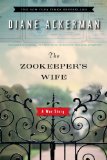Book Club Discussion Questions
In a book club? Subscribe to our Book Club Newsletter!
For supplemental discussion material see our Beyond the Book article, Janusz Korczak and our BookBrowse Review of The Zookeeper's Wife.
Please be aware that this discussion guide will contain spoilers!
- How does Diane Ackerman's background as a naturalist and a poet inform
her telling of this slice of history? Would a historian of World War II have
told it differently, and, if so, what might have been left out?
- Reviews have compared this book to Schindler's List and Hotel
Rwanda. How would you compare them?
- Did this book give you a different impression of Poland during World War
II than you had before?
- Can you imagine yourself in the same circumstances as Jan and Antonina?
What would you have done?
- How would you describe Antonina's relation to animals? To her husband?
How does she navigate the various relationships in the book, given the
extreme circumstances? Is her default position one of trust or distrust?
- Do people have a "sixth sense" and how does it relate to "animal
instinct"?
- Some might judge Jan and Antonina guilty of anthropomorphizing animals
and nature. Would you? Why or why not?
- Can nature be savage or kind–or can only humans embody those qualities?
As science and the study of animal behavior and communication teach us more
and more about the commonalities between animals and humans, is there still
any dividing line between the human and the animal world? If so, how would
you describe it?
- The Nazis had a passion for animals and the natural world. How could
Nazi ideology embrace both a love of nature and the mass murder of human
beings?
- The drive to "rewrite the genetic code of the entire planet" is not
distinct to Nazism. What similar efforts are alive today? Are there lessons
in Jan and Antonina's story for evaluating the benefits and dangers of
trying to modify or improve upon nature? Do you see any connection between
this story of more than sixty years ago and contemporary environmental
issues?
- Genetic engineering of foodstuffs is highly contentious. So are
various reproductive technologies that are now common, such as selecting
for–or against–various characteristics when choosing from sperm or egg
banks. How would various characters in this book have approached these
loaded issues?
Unless otherwise stated, this discussion guide is reprinted with the permission of W.W. Norton & Company.
Any page references refer to a USA edition of the book, usually the trade paperback version, and may vary in other editions.
